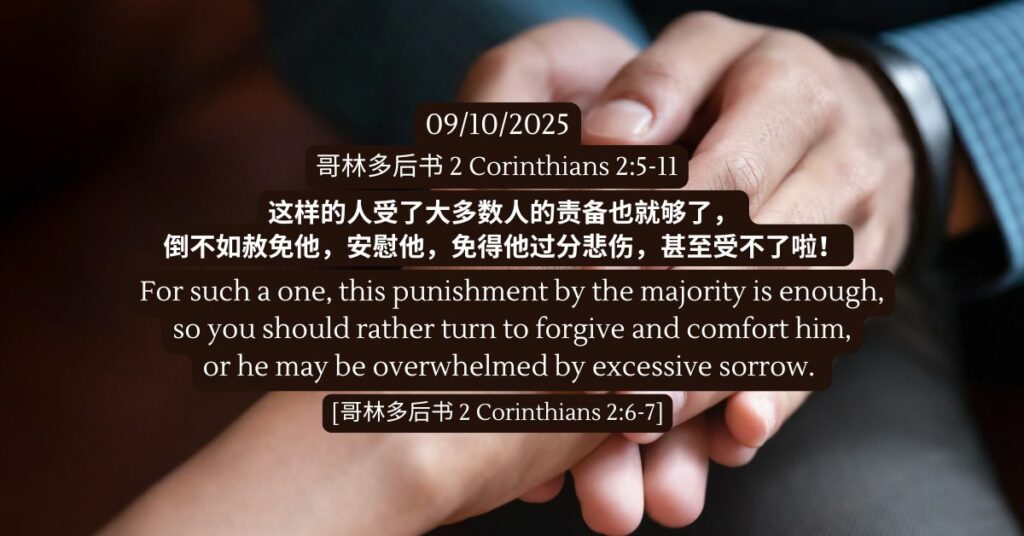2 Corinthians 2:5-11
For such a one, this punishment by the majority is enough, so you should rather turn to forgive and comfort him, or he may be overwhelmed by excessive sorrow. – 2 Corinthians 2:6-7
Click to read
The Corinthian church had accepted Paul’s earlier exhortation and taken disciplinary action against a member who had sinned. The result proved that Paul’s stern letter was effective. The believers in Corinth had indeed exercised firm discipline toward the offender. Paul wrote, “Even if I caused you sorrow by my letter, I do not regret it… yet now I am happy, not because you were made sorry, but because your sorrow led you to repentance” (7:8–9a). Paul saw that the Corinthians were grieved in a godly way, leading them to genuine repentance.
The church is called to be a disciplined community. Every member should strive to live according to the teachings of Scripture. As the psalmist said, “Your word is a lamp to my feet and a light to my path” (Psalm 119:105). Members are to build up and encourage one another, so that God’s house may display His beauty and cause others to say, “Surely God is among them!” Therefore, any behaviour that brings dishonour to the Lord’s name must be addressed and corrected, and when necessary, disciplined.
However, discipline must be applied rightly. It should always aim to uphold truth, honour Scripture’s authority, exercise discernment, and emphasise love, fellowship, and self-sacrifice. The Corinthian believers heeded Paul’s counsel and disciplined the offender. This brought Paul great comfort, yet his pastoral heart was also concerned that the brother “might be overwhelmed by excessive sorrow” (v. 7). Since the man had repented, Paul urged the church to forgive and comfort him, warning that Satan could exploit the situation to sow bitterness and division among them. Church discipline is meant to restore, not destroy.
This incident had caused pain to both Paul and the church (v. 5). As the one most directly wronged, Paul could have acted alone, but instead, he chose to work with the church body. This reveals a key principle of church life, that everything must be done in unity within the body of Christ. He wrote, “Anyone you forgive, I also forgive. And what I have forgiven—if there was anything to forgive—I have forgiven in the sight of Christ for your sake” (v. 10). Paul’s forgiveness prepared the way for reconciliation and unity within the church. His phrase “in the sight of Christ” reminds us that whether we rebuke or forgive, we must act in obedience to the Lord, seeking the guidance of the Holy Spirit, never driven by human anger or pride.
Prayer:
Loving Heavenly Father, thank You for Paul’s example and his pastoral heart. Even when wronged, he chose the path of reconciliation for the sake of the church’s unity. Teach us to follow his example in acting in obedience to You, handling matters according to Your will, and not being led by our own emotions. In the victorious name of our Lord Jesus Christ, we pray. Amen.
Click to read
The Corinthian church had accepted Paul’s earlier exhortation and taken disciplinary action against a member who had sinned. The result proved that Paul’s stern letter was effective. The believers in Corinth had indeed exercised firm discipline toward the offender. Paul wrote, “Even if I caused you sorrow by my letter, I do not regret it… yet now I am happy, not because you were made sorry, but because your sorrow led you to repentance” (7:8–9a). Paul saw that the Corinthians were grieved in a godly way, leading them to genuine repentance.
The church is called to be a disciplined community. Every member should strive to live according to the teachings of Scripture. As the psalmist said, “Your word is a lamp to my feet and a light to my path” (Psalm 119:105). Members are to build up and encourage one another, so that God’s house may display His beauty and cause others to say, “Surely God is among them!” Therefore, any behaviour that brings dishonour to the Lord’s name must be addressed and corrected, and when necessary, disciplined.
However, discipline must be applied rightly. It should always aim to uphold truth, honour Scripture’s authority, exercise discernment, and emphasise love, fellowship, and self-sacrifice. The Corinthian believers heeded Paul’s counsel and disciplined the offender. This brought Paul great comfort, yet his pastoral heart was also concerned that the brother “might be overwhelmed by excessive sorrow” (v. 7). Since the man had repented, Paul urged the church to forgive and comfort him, warning that Satan could exploit the situation to sow bitterness and division among them. Church discipline is meant to restore, not destroy.
This incident had caused pain to both Paul and the church (v. 5). As the one most directly wronged, Paul could have acted alone, but instead, he chose to work with the church body. This reveals a key principle of church life, that everything must be done in unity within the body of Christ. He wrote, “Anyone you forgive, I also forgive. And what I have forgiven—if there was anything to forgive—I have forgiven in the sight of Christ for your sake” (v. 10). Paul’s forgiveness prepared the way for reconciliation and unity within the church. His phrase “in the sight of Christ” reminds us that whether we rebuke or forgive, we must act in obedience to the Lord, seeking the guidance of the Holy Spirit, never driven by human anger or pride.
Prayer:
Loving Heavenly Father, thank You for Paul’s example and his pastoral heart. Even when wronged, he chose the path of reconciliation for the sake of the church’s unity. Teach us to follow his example in acting in obedience to You, handling matters according to Your will, and not being led by our own emotions. In the victorious name of our Lord Jesus Christ, we pray. Amen.

